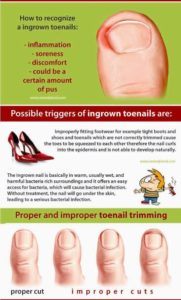Ingrown Toenails Treatment in St. Louis
The medical professionals at Horizon Foot & Ankle Institute can help with any of your foot-related health issues, including trouble with your toenails. Your toes are vital to walking, running, and jumping, and pain caused by an ingrown nail can interfere with all those activities and more. You deserve to live without foot pain, no matter the cause, which is why our St. Louis, MO, clinic takes this matter seriously.
What are the Symptoms of Ingrown Toenails?
First, let's talk about symptoms. How do you know you're dealing with an ingrown toenail and not something else?
The first sign of trouble is usually pain and swelling. Fluid may build up in your toe, putting pressure on the skin and nail. When you examine your toe, the affected area may be inflamed and tender to the touch.
What Causes Them?
Ingrown toenails describe when the toenail grows into the skin. While this can happen on any toe, it occurs most often on the big toe. As for what causes the nail to grow incorrectly, there are a few factors:
- Genetic predisposition
- Foot hygiene
- Injury
- Footwear
- Nail shape
- Posture
Some people have a genetic predisposition for ingrown nails and may experience them repeatedly despite their best efforts. Others may have especially curved toenails that are more likely to grow into the nearby skin.
Individuals with less curved nails can accidentally encourage irregular growth by trimming their nails with angled sides rather than straight across. Failure to keep your feet clean can also lead to ingrown nails.
Finally, injuries, activities, or footwear that put pressure on your toenail can encourage it to grow into the skin. In many cases, addressing these issues is enough to prevent future problems.
What are the Treatment Options?
When you arrive at our St. Louis, MO, location, the podiatrist's first step will be an examination and formal diagnosis. It's essential that we understand the severity of your condition to determine the best course of action.
If your toenails are just ingrown, there are plenty of non-invasive options. However, if they've become infected or if you're at a higher risk of complications, we may need to consider more drastic steps.
Surgical Treatments
A nail disorder or genetic predisposition for ingrown toenails may prompt surgery to remove the nail. In most cases, only part of the nail is removed to decrease the risk of infection in the nail bed.
Ingrown toenail removal may also be an option if you're vulnerable to infection due to diabetes or another medical condition. During this process, the part of the nail growing into the skin is cut away, and the remaining nail is repositioned with cotton. Your doctor will apply a local anesthetic beforehand and provide you with instructions for the healing process afterward.
Non-Surgical Treatments
In most cases, surgery isn't necessary. If the ingrown nail isn't severe, your doctor may prescribe soaking in warm water, which will soften the skin and reduce inflammation. Please note that you shouldn't try to "correct" the nail yourself with nail clippers, as that may lead to infection.

Source: Remedy Land
Why is Treatment Important?
What happens if you don't treat ingrown toenails? Untreated, they can become infected. An infected nail is even more painful and accompanied by the following symptoms:
- Overgrowth of skin
- Swollen, red skin
- Oozing pus
- Bleeding
Ingrown toenail treatments are vital for infected toes because the infection may not go away on its own. In fact, left untreated, toenail infections can lead to the following:
- Tissue death
- Tissue decay
- Loss of blood flow
- Open sores
- Foot ulcers
- Bone infection
How Can Horizon Foot & Ankle Institute Help?
Do you have an infected ingrown toenail or other foot complications? Horizon Foot & Ankle Institute can help. To make an appointment at our St. Louis, MO, clinic, give us a call at (314) 381-1800 or contact us online.
